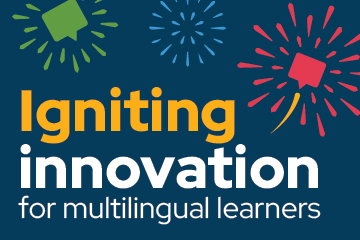Resources/Recursos
Featured Resources



All resources/Todos los recursos
WIDA ELD Standards Framework, 2020 Edition - Grades 4-5 Materials
This resource includes the grades 4-5 materials that are part of the WIDA English Language Development Standards Framework, 2020 Edition. The materials specific to this grade-level cluster have been pulled together to provide educators of students in grades 4-5 with a smaller, more manageable booklet to support their implementation of the WIDA ELD Standards Framework in their classroom.
Resource Details View Download NowWIDA ELD Standards Framework, 2020 Edition - Grades 6-8 Materials
This resource includes the grades 6-8 materials that are part of the WIDA English Language Development Standards Framework, 2020 Edition. The materials specific to this grade-level cluster have been pulled together to provide educators of students in grades 6-8 with a smaller, more manageable booklet to support their implementation of the WIDA ELD Standards Framework in their classroom.
Resource Details View Download NowWIDA ELD Standards Framework, 2020 Edition - Grades 9-12 Materials
This resource includes the grades 9-12 materials that are part of the WIDA English Language Development Standards Framework, 2020 Edition. The materials specific to this grade-level cluster have been pulled together to provide educators of students in grades 9-12 with a smaller, more manageable booklet to support their implementation of the WIDA ELD Standards Framework in their classroom.
Resource Details View Download NowWIDA ELD Standards Framework, 2020 Edition - Kindergarten Materials
This resource includes the Kindergarten materials that are part of the WIDA English Language Development Standards Framework, 2020 Edition. The materials specific to this grade level have been pulled together to provide educators of students in Kindergarten with a smaller, more manageable booklet to support their implementation of the WIDA ELD Standards Framework in their classroom.
Resource Details View Download NowWIDA English Language Development Standards and Resource Guide, International Edition
WIDA intends to fully retire the WIDA English Language Development Standards and Resource Guide, International Edition: Kindergarten-Grade 12. However, we recognize that schools have different timelines for implementation of the updated WIDA ELD Standards Framework, 2020 Edition. With that in mind, the earlier International Edition will remain in the Resource Library so that schools that are still using it may access it as needed.
The international edition of the 2012 Amplification of the WIDA English Language Development Standards was developed in response to growing interest from educators outside the U.S. for standards and assessments that can support and document the development of academic English among their students.
The 2012 ELD Standards Framework represented the social, instructional and academic language that students need to engage with peers, educators, and the curriculum in schools and included examples of how language is processed or produced within a particular context through Model Performance Indicators (MPIs). MPIs were meant to be examples and not fixed guidelines of the language with which students may engage during instruction and assessment.
Resource Details View Download NowWIDA MODEL and ACCESS for ELLs Concordance Table
WIDA research findings show that MODEL Online overall composite scale scores can predict overall composite proficiency level (PL) scores on ACCESS for ELLs. Use the table in this document to look up a student's overall composite scale score on MODEL Online and estimate the PL score that they would be likely to receive on ACCESS.
Resource Details View Download NowWIDA MODEL and the CEFR
WIDA conducted a research study that linked WIDA MODEL Online scale scores to the Common European Framework of Reference (CEFR). This video discusses the research study, the findings, and the Understanding WIDA MODEL Online Scale Scores in Terms of CEFR Levels tool.
Resource DetailsWIDA MODEL Interpretive Guide for Score Reports
This guide is meant to assist stakeholders in understanding the scores reported for WIDA MODEL test takers in Kindergarten through Grade 12.
Resource Details View Download NowWIDA MODEL Speaking Rubric Grades 1-12
Rubrics are analytic scales that describe various aspects of spoken and written language to help educators recognize what speaking and writing sound and look like at various levels of English language proficiency. Use the WIDA MODEL Speaking Rubric to understand the scores students earn on the assessment, analyze student performance in the classroom, and plan ways to scaffold language learning. WIDA MODEL test administrators use the WIDA MODEL Speaking Rubric to score the Speaking domain test for WIDA MODEL Online, WIDA MODEL Paper and WIDA MODEL for Kindergarten.
Resource Details View Download NowWIDA MODEL Writing Rubric Grades 1-12
Rubrics are analytic scales that describe various aspects of spoken and written language to help educators recognize what speaking and writing sound and look like at various levels of English language proficiency. Use the WIDA MODEL Writing Rubric to understand the scores students earn on the assessment, analyze student performance in the classroom, and plan ways to scaffold language learning. WIDA MODEL test administrators use the WIDA MODEL Writing Rubric to assign a Writing Final score for WIDA MODEL Paper and WIDA MODEL Online.
Resource Details View Download NowWIDA Proficiency Level Descriptors: Informing Expectations and Scaffolding
This Snapshot will give K-12 educators ideas on how to apply the Proficiency Level Descriptors as they consider scaffolding practices that support multilingual students in meeting grade level content learning goals.
Resource DetailsWIDA Screener Interpretive Guide for Score Reports
The aim of this interpretive guide is to help educators and families better understand the scores reported for WIDA Screener Online, WIDA Screener Paper, and WIDA Screener for Kindergarten.
Resource Details View Download NowWIDA Speaking Scoring Scale Grades 1-12
Scoring scales isolate key language features described in interpretive rubrics to help local test administrators and centralized raters assign scores to speaking and writing samples. The WIDA Speaking Scoring Scale is developed from the WIDA Speaking Rubric and is used only to score responses to ACCESS for ELLs (Online and Paper) and WIDA Screener test items.
Resource Details View Download NowWIDA Writing Scoring Scale Grades 1-12
Scoring scales isolate key language features described in interpretive rubrics to help local test administrators and centralized raters assign scores to speaking and writing samples. The WIDA Writing Scoring Scale is developed from the WIDA Writing Rubric and is used only to score responses to ACCESS for ELLs (Online and Paper) and WIDA Screener test items.
Resource Details View Download NowYoung Multilingual Children in Maryland
In this study, completed for the Maryland State Department of Education, we explore the perceptions, experiences and decision-making of 27 parents of young multilingual children, ages birth to 5 years. The focus revolves around children’s language learning and development, family engagement practices and children’s participation in early care and education (ECE) programs.
Published 2020
Resource Details View Download NowYoung Multilingual Children in Minnesota
In this study, completed for the Minnesota Department of Education, we explore the perceptions, experiences and decision-making of 15 parents of young multilingual children, ages birth to 5 years. The focus revolves around children’s language learning and development, family engagement practices and children’s participation in early care and education (ECE) programs.
Published 2020
Resource Details View Download NowYoung Multilingual Children in Pennsylvania
In this study, completed for the Pennsylvania Office of Child Development and Early Learning, we explore the perceptions, experiences and decision-making of 13 parents of young multilingual children, ages birth to 5 years. The focus revolves around children’s language learning and development, family engagement practices and children’s participation in early care and education (ECE) programs.
Published 2020
Resource Details View Download Now



